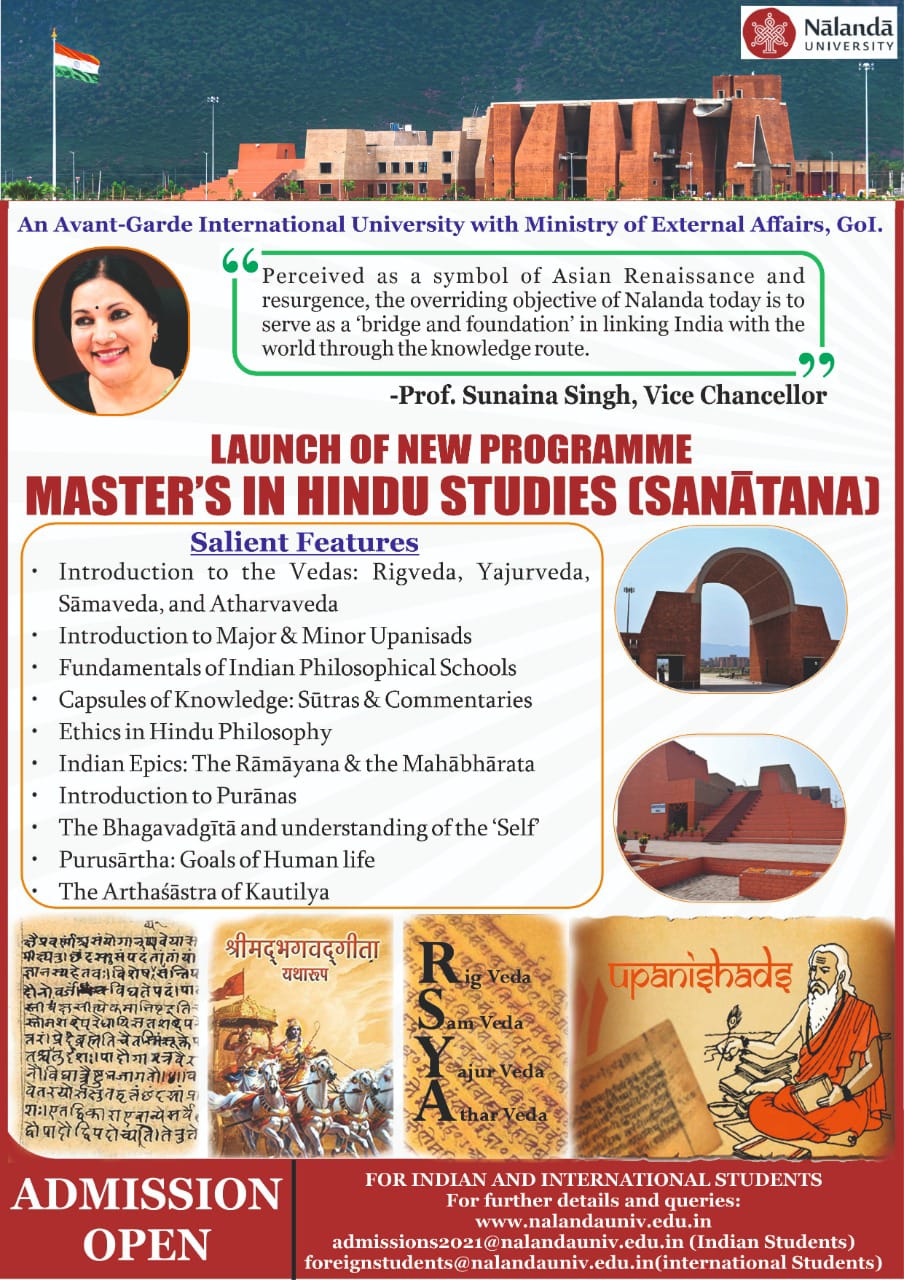Author: Vision & Global Trends – 20/09/2021

Towards new Asian Renaissance
The rediscovery of inter-Asian linkages in recent times has led to a resurgence in discovering and building upon a shared history. Nalanda University is envisaged as an icon of this new Asian renaissance: a creative space that will be for future generations a center of Inter civilizational dialogue.
Sanātana Hindu Studies (M.A.)
Over the millennium, the ancient seers, saints living across the river Sindhu made intuitive realisation of the eternal spiritual truth (satya). They visualised the core principles which governs the world causing material as well as spiritual progress of every living being known as dharma.
जगतःस्थितिकारणंप्राणिनांसाक्षात्अभ्युदयनिःश्रेयसहेतुर्यः स धर्मः ।
– (Śaṅkarācārya in his commentary on the Bhagavadgītā)
The core and eternal principles known as the Sanātana dharma, the mighty edifice of the Indian civilisation is manifested and transmitted both orally and textually within a variety of knowledge traditions and practices. The study of such rich oral as well as textual traditions and practices is the kernel of Hindu study. Different streams of the Hindu studies are like the branches of a single living tree of Indian culture, thought, ritual, and spirituality.
The course has been envisioned, designed and structured by the Hon’ble Vice Chancellor Prof. Sunaina Singh. It is uniquely designed to grasp the rich spiritual as well as intellectual system of the Hindus – a distinctively interdisciplinary system where the textual and the oral, the verbal and the visual, the scientific and the metaphysical, the transcendental and the functional are interlocked as parts of a whole. (Kapila
Vatsyayana in Kalātattvakośa)
Courses
- Introduction to the Vedas: Ṛgveda, Yajurveda, Sāmaveda, and Atharvaveda
- Introduction to Major & Minor Upaniṣads
- Introduction to Itihāsa texts: The Rāmāyaṇa & the Mahābhārata
- Introduction to Purāṇa texts: Viṣṇu Purāṇa, and Agni Purāṇa
- Ethics in Hindu Philosophy
- Fundamentals of Hindu Philosophy
- The Bhagavadgītā and understanding of the ‘Self’
- Puruṣārthas: Goals of Human Life
- The Yogasūtra of Patañjali: Theory and Practice
- Studying the Nāṭyaśāstra of Bharatamuni (first chapter)
- Basic Tenets of Major Upaniṣads: Chāndogya Upaniṣad & Bṛhadāraṇyaka Upaniṣad
- Ancient Knowledge Tradition
- Philosophy of Language: Introduction to Mahābhāṣya and Vākyapadīyam
- Study of Pañcatantra
- Poets & Philosophers of highest awakening
- Capsules of Knowledge: Sūtra, Vārtika & Bhāṣya (Commentaries)
- Study of Smṛti texts: The Yājñavalkya Smṛti
- The Arthaśāstra of Kauṭilya
- Study of Vedanta Philosophy with Śaṅkarācārya, Rāmānujacārya, Madhvācārya and Sadānanda
- Mastering Sanskrit Language
- Seminar Course
- Dissertation
Mandate
The two-year M.A. programme in Sanātana Hindu Studies will
- Attempt to retrieve the resource pool of knowledge on Hindu dharma and its spiritual traditions.
- Provide an overview of spiritual Hindu literatures and basic tenets therein.
- Introduce the major and minor texts along with select fundamental commentaries.
- Provide an opportunity to develop the specialization in any stream of Sanātana Hindu Studies.
- Foreground the relevance of the Sanātana Hindu Studies in the contemporary changing world order.
Outcome of the Programme
A student with a MA degree in Sanātana Hindu Studies shall – Develop a good understanding of foundational principles underlying Hindu spiritual traditions and culture.
Course Curriculum
- 10 Core courses equivalent to 30 credits (3 X 10)
- 7 Electives equivalent to 21 credits (3 X 7)
- 4 Reading Seminar courses equivalent to 4 credits (1 X 4)
- Dissertation equivalent to 9 credits
Total: 64 credits
Semester I: Foundation Courses
- 4 Core courses
- 1 Elective
- 1 Reading Seminar
Semester II: Bridge Courses
- 3 Core courses
- 2 Electives
- 1 Reading Seminar
Semester III: Advanced Courses
- 2 Core courses
- 3 Electives
- 1 Reading Seminar
Semester IV: Specialized Courses
- 1 Core Course
- 1 Elective
- 1 Reading Seminar
- Dissertation
The students may accumulate additional credits to their existing bank of credits as per University rules.
